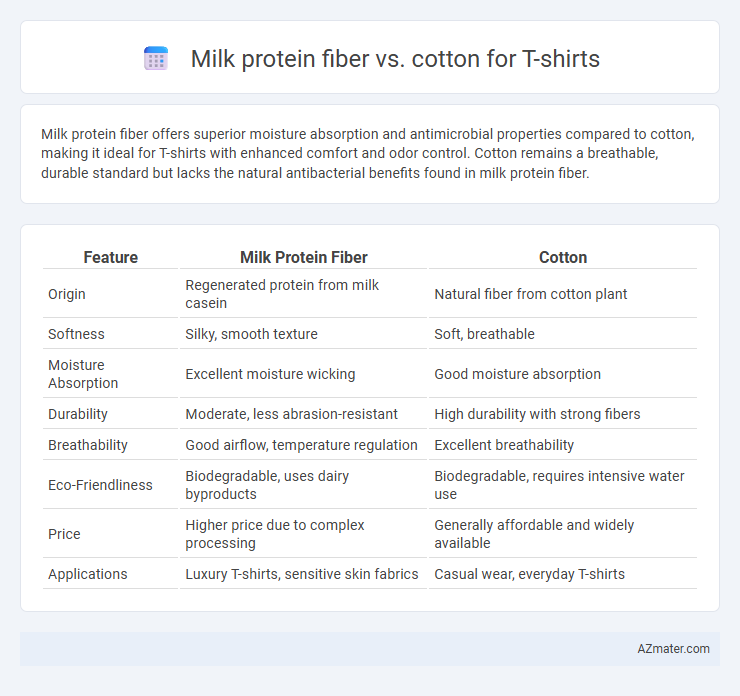Milk protein fiber offers superior moisture absorption and antimicrobial properties compared to cotton, making it ideal for T-shirts with enhanced comfort and odor control. Cotton remains a breathable, durable standard but lacks the natural antibacterial benefits found in milk protein fiber.
Table of Comparison
| Feature | Milk Protein Fiber | Cotton |
|---|---|---|
| Origin | Regenerated protein from milk casein | Natural fiber from cotton plant |
| Softness | Silky, smooth texture | Soft, breathable |
| Moisture Absorption | Excellent moisture wicking | Good moisture absorption |
| Durability | Moderate, less abrasion-resistant | High durability with strong fibers |
| Breathability | Good airflow, temperature regulation | Excellent breathability |
| Eco-Friendliness | Biodegradable, uses dairy byproducts | Biodegradable, requires intensive water use |
| Price | Higher price due to complex processing | Generally affordable and widely available |
| Applications | Luxury T-shirts, sensitive skin fabrics | Casual wear, everyday T-shirts |
Introduction: The Rise of Innovative T-Shirt Fabrics
Milk protein fiber T-shirts offer exceptional softness and natural moisture-wicking properties derived from casein proteins, providing enhanced comfort compared to traditional cotton. This innovative fabric is hypoallergenic and biodegradable, appealing to eco-conscious consumers seeking sustainable alternatives to conventional cotton. The rise of milk protein fiber marks a shift in textile technology, blending functionality with environmental responsibility in everyday apparel.
What is Milk Protein Fiber?
Milk protein fiber is a bio-based textile derived from casein, a protein found in milk, offering softness and moisture-wicking properties ideal for T-shirts. This innovative fabric is biodegradable and hypoallergenic, providing a sustainable alternative to conventional cotton while maintaining durability and breathability. Unlike cotton, which requires extensive water and pesticide use, milk protein fiber is produced with lower environmental impact, making it a compelling choice for eco-conscious apparel.
Cotton: The Classic T-Shirt Material
Cotton remains the classic choice for T-shirts due to its natural breathability, softness, and durability, making it ideal for everyday wear. Unlike milk protein fiber, cotton offers superior moisture absorption and ease of care, contributing to long-lasting comfort and versatility. Its widespread availability and affordability ensure that cotton T-shirts continue to dominate the casual apparel market.
Sustainability Comparison: Milk Protein Fiber vs Cotton
Milk protein fiber offers a sustainable alternative to traditional cotton by utilizing renewable dairy industry byproducts, significantly reducing water consumption and pesticide use compared to cotton cultivation. Cotton farming accounts for approximately 20% of global insecticide use and consumes vast amounts of freshwater, whereas milk protein fiber production emits lower greenhouse gases and promotes biodegradability. The environmental footprint of milk protein fiber is substantially smaller, making it a more eco-friendly choice for sustainable T-shirt manufacturing.
Comfort and Feel: Textural Differences
Milk protein fiber offers a silky, smooth texture that feels lightweight and breathable against the skin, enhancing all-day comfort. Cotton, known for its natural softness and durability, provides a slightly coarser feel but excels in moisture absorption and breathability. The unique amino acid structure of milk protein fibers contributes to a gentle, cooling sensation, while cotton's natural cellulose fibers ensure a familiar, breathable comfort.
Moisture-Wicking and Breathability
Milk protein fiber outperforms cotton in moisture-wicking due to its superior ability to absorb and quickly release sweat, keeping the skin dry and comfortable. Its breathable structure promotes efficient air circulation, reducing heat retention and enhancing overall comfort during physical activity. Cotton, while natural and soft, tends to retain moisture longer, leading to a heavier, less breathable fabric that can feel damp during intense wear.
Durability and Longevity of Each Fabric
Milk protein fiber offers excellent durability due to its strong molecular structure and resistance to wear, maintaining shape and softness after multiple washes. Cotton, while breathable and comfortable, tends to weaken and lose integrity over time with frequent laundering and exposure to sunlight. Choosing milk protein fiber for T-shirts ensures longer-lasting garments with sustained fabric strength compared to traditional cotton options.
Skin Sensitivity and Hypoallergenic Properties
Milk protein fiber exhibits excellent hypoallergenic properties, making it ideal for people with sensitive skin as it reduces the risk of irritation and allergies. Unlike cotton, which may retain pesticides or chemicals from conventional farming, milk protein fiber is naturally antimicrobial and gentle, promoting better skin health. This fiber's ability to maintain moisture balance further enhances comfort for individuals prone to skin sensitivity.
Cost and Market Availability Analysis
Milk protein fiber T-shirts generally cost more than cotton due to higher production expenses and limited manufacturing scale. Cotton dominates the market with widespread availability, extensive supply chains, and lower raw material costs, making it the preferred choice for affordable T-shirts. Market data shows milk protein fiber remains a niche material primarily found in premium or eco-conscious apparel segments.
Which is Better for T-Shirts: Final Verdict
Milk protein fiber offers superior softness, moisture-wicking properties, and natural antibacterial benefits compared to traditional cotton, making it an excellent choice for comfortable and breathable T-shirts. Cotton remains durable, widely available, and cost-effective, but it can retain moisture and may lack the hypoallergenic advantages of milk protein fiber. For premium comfort, performance, and skin-friendly wear, milk protein fiber is the better option, whereas cotton suits those prioritizing durability and affordability.

Infographic: Milk protein fiber vs Cotton for T-shirt
 azmater.com
azmater.com